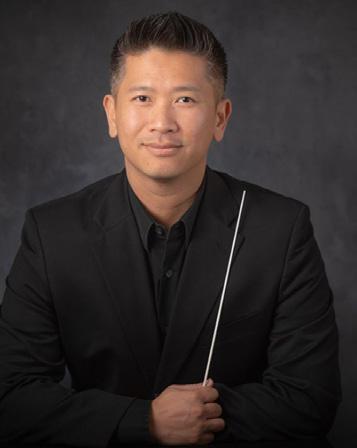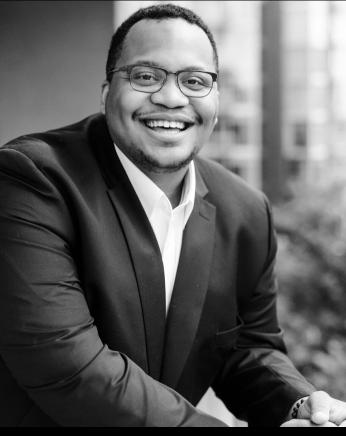Pacific Wind Bands

Saturday I April 15, 2023 I 7:30 pm

Serenade in C minor, K. 384a (K. 388) (1783)
I. Allegro
Dream Machine (2016)
I Am Enough (2023) (Consortium Premiere)
ADHD/Sadness
Anxiety/Fear
The Rise of the Sun God (2023) (World Premiere)
Wolfgang Amadè Mozart
(1756–1791)
Katherine Bergman
(b. 1985)
Marie A. Douglas
(b. 1987)
Little Mexican Suite (2022)
I. Ahuehuete (Montezuma Cypress)
IV. Sahuaro (Cactus)
Requiem for the Unarmed (2020)
Logan Feece ’23
(b. 2001)
Nubia Jaime Donjuan
(b. 1984)
Kevin Day
(b. 1996)
Shimmering Sunshine (2019)
Kevin Day
(b. 1996)
Mozart composed this work, referred to interchangeably as a serenade or Nachtmusik (night music), while he was in Vienna in 1782 or 1783. Though historians speculate that it had to be written very quickly, little is known about who may have commissioned the work or the intended performance occasion. Of the several serenades Mozart wrote for winds during the early 1780s, this work stands out from the others for its minor key, striking character, and advanced themes. Together, these qualities produce an unusual serenade, one that is far more passionate and involved than the background music or light entertainment that was typically expected of serenades. Mozart revisited the work in 1787 when he arranged it for string quintet, K. 516b (K. 406).
The entire Serenade is in four movements and its organization is akin to the structure of contemporaneous symphonies. The first movement which is being performed this evening is in sonata-allegro form, which includes two longer repeating sections—the exposition followed by the development and recapitulation—which move through several themes as they are transformed and repeated throughout the work.
The bold ensemble statement and mysterious, moving line which follows in the clarinets establish the ominous and serious character that carries throughout most of this movement. Next, the second theme is performed prominently by the oboe each time it appears, before it is reinforced further by other instruments. The sudden dynamics, volatile changes in mood, and regular suspensions build anticipation and demand patience of the listener up until the exciting satisfaction of the closing theme.
The development opens with new material briefly led by the clarinet, providing mellow contrast to the pronounced tone of the oboe that follows. A surprising measure of complete silence is followed by the long-awaited return of the bold statement which had opened the entire piece, marking the beginning of the recapitulation.
Ainsley Berryhill ’24Logan Feece: The Rise of the Sun God
Note by the composer
Rise of the Sun God is a new wind band composition, written for Pacific's Wind Ensemble this semester after being chosen in the 2022 Wind Ensemble Commission Contest that was held by Pacific’s Conservatory. My influences include contemporary wind band and film score composers, as well as anime and video game score composers. The piece is in a simple A-B-A format, with short,
slow A sections, and a longer, fast and exciting B section. The piece has the whole ensemble playing throughout most of its seven-minute runtime and includes some ocarina and English horn features. I employ a variety of orchestration techniques to create excitement, including sudden dynamic shifts, unexpected harmonies, and intricate counterpoint. Overall, I strove, in Rise of the Sun God, to create an energetic and dynamic addition to the wind band repertoire and to showcase thrilling music that draws on a wide range of influences.
Katherine Bergman: Dream Machine
Note by the composer
The meaning behind Dream Machine is two-fold. In one sense the title suggests the brain is a “dream machine,” generating odd, otherworldly landscapes when neural activity reaches a certain state. Simultaneously it refers to a physical art piece designed by artist Brion Gysin called the Dreamachine. The Dreamachine is a phonograph-driven stroboscope described as “the first art object to be seen with the eyes closed” and is intended to affect the viewer's brain alpha wave activity. Whether the “machine” is the sculpture, the brain, the music itself, or all of the above is open to interpretation.
Marie A. Douglas: I Am Enough
I Am Enough was commissioned by the California Band Directors Association 2023 Social Impact Consortium. The premiere was given by the California All State Wind Symphony conducted by Gary Gilroy at California All State Music Educators Conference (CASMEC) February 2023. The piece is in two movements for wind band on the topic of mental health.
Note by the composer
Written in 2022, the piece is centered around teen mental health and wellness with each movement telling the story of a fictional teen overcoming their struggles with Anxiety/Fear and ADHD/Sadness, respectively. I Am Enough travels through genres and regions of the African diaspora and Latin America, mixing in R & B, Southern hip-hop, and Mexican folkloric vibes.
In the first movement we meet Elena, a ballerina whose family immigrated from Mexico. We join her in ballet class, where she often drifts off into the depths of her imagination during the warmup session, causing what starts out as a waltz feel to morph into a Mexican influenced folkloric dance adventure, where Elena feels at home. Beginning firmly in B-flat major, the movement then teetertotters
between a B-flat altered harmonic minor scale and the original key. Accompanied by percussion often found in the music of Latin America, this movement takes the listener and performer on a journey into the mind of a young lady longing to learn more about herself and her culture.
In the second movement, you are introduced to Jace, a non-gender-conforming teen who struggles with anxiety. We first sonically observe Jace in the midst of an amazing slumber, depicted by the soprano woodwinds. As their angelic sleep begins to deteriorate due to sobering interruptions occurring via the percussion and brass, Jace realizes that they were snoozing their alarm this entire time, panic sinks in and attempts to have Jace conform to its plan. An internal battle is demonstrated via an epic ballad section. Jace arises victoriously after reading affirmations from their great-aunt, the way their therapist advised.
My goal in composing this work—via the textures and orchestration, in addition to the stylistic choices, and literary aspects—was to cover a variety of musical phenomena displaying some of the prevailing cultures of the young people walking the hallways of America’s schools and telling their stories. We see you! Keep striving!
Kevin Day: Requiem for the Unarmed
For information about Kevin Day, please see his biography under “Composer-in-Residence.”
Although not premiered until 2022, Requiem for the Unarmed was commissioned by the California Band Directors Association 2020 Social Impact Consortium and composed that summer. The premiere was given by the California All State Wind Symphony under the direction of Cynthia Johnston Turner at the 2022 California State Music Educators Conference.
On May 25, 2020, Minneapolis resident George Floyd was murdered by police officers, one of whom had a knee on his neck, cutting off all oxygen to his brain. Floyd’s last words, the same words used by Eric Garner in 2014, echo across the United States and throughout the world.
“I. can’t. breathe.”
Seeing the footage of his murder on television, my heart sank, and I felt incredibly sick to my stomach. I couldn’t believe what I had witnessed, and it took me weeks to process what had transpired. Someone who looks like me was just murdered in cold blood by law enforcement. I can recall the many people who also look like me
Note by the composerwho were murdered in similar fashion, both by law enforcement and by civilians with racist intent. Their names became social media hashtags, and ring in the hearts of every Black man, woman, and child in the United States.
Eric Garner, Michael Brown, Tamir Rice, Philando Castile, Treyvon Martin, Ahmaud Arbery, Atatiana Jefferson, Breonna Taylor, George Floyd . . .
A growing list of names. The unarmed Black victims of racial injustice. Too many names to count.
A fear that I have to this day is that someone I know will end up on this list too. Whether that be a family member, friend, mentor, colleague, or even me.
Requiem for the Unarmed is my musical response to the death of George Floyd and the countless Black lives lost due to racial injustice in the United States. This piece is meant to be a memorial to those lives lost and is my plea and prayer.
“May this happen no more.”
Kevin
Day:
Shimmering Sunshine
For information about Kevin Day, please see his biography under “Composer-in-Residence.”
This work was written in conjunction with the M.O.T.I.F triptych consortium, including Across the Golden Sky by Quinn Mason and Midnight Skyline by Josh Trentadue.
Note by the composer
Shimmering Sunshine is a composition that depicts the sun whenever it is positioned at high noon, at its brightest point during the day. Throughout the piece, there are different “shimmers” of bright light that bounce around from instrument to instrument, depicting moments of sunshine both beautiful and at the same time, powerful.
Nubia Jaime Donjuan: Little Mexican Suite
Note by the composer
Ever since I was a child, I have been very interested in traditional Mexican music. It has always captured my attention. I used to really get excited to hear a danzón or a son jarocho, and, fortunately, that interest has become a fundamental part of my
artistic work. Most of my works contain a national, and often regional, root. As is well-known, Mexican music has many branches, ranging from danzón to mariachi.
When Brian Messier [director of bands at Dartmouth College] approached me, I was immediately overcome by the urge to compose a suite for symphonic band inspired by popular Mexican genres. Almost naturally, the themes for each movement began to appear, and in a short time I had developed them all. It was clear to me that each should be different. I did not want to repeat any genre. Music chooses the composer and takes its own course, and as expected, these movements were connecting with each other, one appearing in another as reminiscences of the past, as light brushstrokes, on occasions hidden and at times very exposed.
Little Mexican Suite for winds is based on traditional Mexican musical genres that are very popular in my country. It is inspired by species of Mexican trees that have each touched my life in some way and are embedded in my memory.
I. Ahuehuete (Montezuma Cypress): The giant. Inspired by the most emblematic tree in Santa María del Tule in Oaxaca. Full of colors, textures, and vitality, it denotes fascination with this famous Árbol del Tule.
IV. Sahuaro (Cactus): The cactus. Very tall and full of water, with thorns and of unparalleled green. A forest of sahuaros lies midway between my city and the nearby bay and, since I was little, they have captured my attention. Without any doubt, this movement had to be a danzón, my favorite genre of all time.
DIRECTOR
Vu Nguyen is an associate professor of music and director of bands at the University of the Pacific. He conducts the Symphonic Wind Ensemble and Concert Band, and he teaches courses in conducting and music education. Nguyen maintains an active schedule as a clinician and has served as guest conductor with the United States Air Force Bands of the Golden West and Mid-America as well as honor bands across the country. Ensembles under his direction have performed at state music educator conferences, at the Midwest Clinic, and at the College Band Directors National Association Conference.
A native of the San Francisco Bay Area, Nguyen holds degrees in conducting from the University of Washington and the University of Oregon, and he earned a Bachelor of Music degree in music education from the University of the Pacific. Prior to his appointment at Pacific, he served in similar roles at the University of Connecticut, University of Indianapolis, and Washington University in St. Louis in addition to being a visiting conductor with the Indiana University Concert Band. He began his teaching career in the San Ramon Valley Unified School District.

In addition to his academic career, Nguyen recently retired as an officer in the Air National Guard (ANG) where he was the commander and conductor of the ANG Band of the West Coast. In this position, he was responsible for all activities of this forty-member squadron, including participation in ceremonies, parades, concerts, and other public performances.
COMPOSER-IN-RESIDENCE
An American whose music has been characterized by “propulsive, syncopated rhythms, colorful orchestration, and instrumental virtuosity,” (Robert Kirzinger, Boston Symphony), composer Kevin Day has quickly emerged as one of the leading young voices in the world of music composition today, whose music ranges from powerful introspection to joyous exuberance. Kevin Day is an internationally acclaimed composer, conductor, and pianist, whose music often intersects the worlds of jazz, minimalism, Latin music, fusion, and contemporary classical idioms. Day serves as the vice president of the Millennium Composers Initiative, a collective of more than 120 composers from several countries around the world.
A winner of the BMI Student Composer Award, a three-time finalist for the ASCAP Morton Gould Young Composer Award, and considered for the 2022 Pulitzer Prize for his Concerto for Wind Ensemble, Day has composed over

200 works, and has had numerous performances throughout the United States, Russia, Austria, Australia, Taiwan, South Africa, and Japan. His works have been programmed by the symphonies of Boston, San Francisco, Detroit, Indianapolis, Houston, and more, as well as several top professional and collegiate wind ensembles. His works have been performed at Carnegie Hall, Rachmaninov Hall (Russia), the Midwest Clinic, and other major venues, and recently he had his Carnegie Hall conducting debut at the 2022 New York International Music Festival.
Day has collaborated with David Childs, Nicki Roman, James Markey, Wendy Richman, Jens Lindemann, Demondrae Thurman, Hiram Diaz, Steven Cohen, Jeremy Lewis, and more, on works for their respective instruments, as well as chamber ensembles like One Found Sound, Axiom Brass, Ensemble Dal Niente, the Sheffield Chamber Players, the Puerto Rican Trombone Ensemble, the Zenith Saxophone Quartet, the Tesla Quartet, and the Boston Symphony Orchestra Low Brass Section.
Day is assistant professor of composition at Wilfrid Laurier University in Waterloo, Ontario, Canada. He is pursuing his doctorate in composition from the University of Miami Frost School of Music where he studies with Charles Norman Mason, Dorothy Hindman, and Lansing McCloskey. He holds a master’s degree in composition from the University of Georgia, and bachelor’s degree in performance from Texas Christian University. He is alumnus of Kappa Kappa Psi National Honorary Band Fraternity and Phi Mu Alpha Sinfonia Fraternity of America.
PACIFIC WIND BANDS
The Pacific Wind Bands at the Pacific Conservatory comprise students who represent music majors, minors, and non-majors from across the university. The ensemble performs at least four concerts each academic year. It provides students the opportunity to play a broad range of music for winds, brass, percussion, and keyboards drawn from a repertoire that honors the rich history of the past and looks to the future, ranging from chamber to full wind band instrumentation. Recent premieres and collaborations with composers include Viet Cuong, Jennifer Jolley, Catherine Likhuta, Giovanni Santos, Alex Shapiro, Ingrid Stölzel, and James Syler.
Flutes
Mari Anderson
Ashley Bonfoey
Kalea Bringas
Grace Coon
Phoenix Farris
Logan Feece
Jessica Jenkins
Marcus Loya
Jasmine Valentine
Victoria Wang
Oboes
Glenn Adcock
Jenna Bosnick
Hannah Estrella
Valeria Rosseau Nunez
Clarinets
Damien Burgos
Kyle Chang
Kaitlyn Ferreira
Rosie Fox
Edgard Gonzales
Maggie Juarez
Gerardo Lopez
Jordan Mabutas
Sophia Rechel
Andrew Seaver
Samuel Vu
WIND BAND MUSICIANS
Bassoons
Justin Silva
Ealaph Tabbaa
Jordan Wier
Saxophones
Gavin Downing
Ricardo Martinez
Tristan McMichael
Mateo Ruiz
Kyle Saelee
Horns
Mary Denney
Edgar Leyva
Don Parker
Jada Ramos
Braydon Ross
Trumpets
Ainsley Berryhill
Parker Deems
Keagan Low
Alayna Ontai
Kylie Ward
Trombones
William Giancaterino
Jayden Laumeister
Matthew Miramontes
Seth Neves
Euphonium
Victor Alcaraz
Tuba
Alejandro Villalobos
Double Bass
Miguel Velarde
Percussion
Robin Bisho
Huey Chan
Leonard Cox
Jonathan Herbers
Matthew Kulm
Mallory Norman
Aiden Valdez
Emily Winsatt
Piano Magdalene Myint
PACIFIC FACULTY COACHES
Brittany Trotter: Flutes
Kyle Bruckmann: Oboes
Patricia Shands: Clarinets
Ricardo Martinez: Saxophones
Nicolasa Kuster: Bassoons
Leonard Ott: Trumpets
Sadie Glass: Horns
Bruce Chrisp: Low Brass
Jonathan Latta: Percussion
Jonathan Latta: Ensembles Program Director
Every gift to the Conservatory from an alum, parent, or friend makes an impact on our students. Our students rely on your generosity to enable them to experience a superior education.
Please contact the Assistant Dean for Development at 209.932.2978 to make a gift today. You may also send a check payable to University of the Pacific: Conservatory of Music, University of the Pacific Attn: Assistant Dean for Development

3601 Pacific Avenue Stockton, CA 95211
UPCOMING CONSERVATORY EVENTS

Apr. 16 | 2:30 pm
28/78 New Music Ensemble
Faye Spanos Concert Hall
Apr. 16 | 5:00 pm
Student Recital
Glenn Michael Adcock, oboe Recital Hall
Apr. 16 | 7:30 pm
Student Recital
Marcus Loya, composition
Faye Spanos Concert Hall
Apr. 17 | 7:30 pm
Pacific Varied Ensembles
Recital I
Faye Spanos Concert Hall
